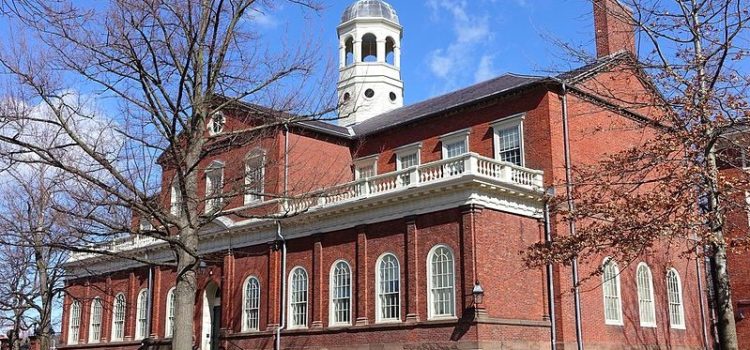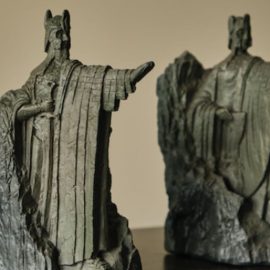

This article is an excerpt from the Shortform summary of "Educated" by Tara Westover. Shortform has the world's best summaries of books you should be reading.
Like this article? Sign up for a free trial here .
How did Educated author Tara Westover go from a dubious homeschool education to Harvard? What was Tara Westover’s Harvard life like?
Educated is the autobiographical story of Tara’s Westover’s journey from being the child of extreme anti-government, anti-science, and religious fundamentalist Mormon parents to becoming a Cambridge- and Harvard-educated PhD. As you’ll see, Tara Westover’s Harvard life wasn’t all about academics. It was while Westover was at Harvard that her family life fell apart and depression almost prevented her from finishing her Ph.D.
Tara Westover’s Pre-Harvard Life
Born in her family’s isolated home in the mountains of Idaho, Tara was denied a proper education as a child. Her father, Gene, believed that public schools were a tool of the “socialist” U.S. government, meant to “brainwash” people. As such, he kept his children out of school and relegated them to a dubious homeschooling curriculum designed by his wife, Faye, who lacked any proper credentials for educating children. There were no tests or exams at Faye’s rudimentary school, and Tara mostly learned to read and write by studying the Holy Bible and the Book of Mormon. Because of this, Tara had enormous gaps in her knowledge—she barely knew the basics of elementary math and was deeply ignorant on key historical facts about the U.S. and the world.
Tara Westover Goes to Harvard
After getting her B.A. at Brigham Young University, Westover started a graduate degree in history at the University of Cambridge. While there, Tara won a visiting fellowship at Harvard. But the weight of her recent family trauma hung over this accomplishment like a dark cloud. Never had she felt so gloomy and indifferent about a piece of good news.
One of Tara’s brother’s, Shawn, had been abusing her for years. When she finally talked to her family about it, there was a huge backlash. Tara’s parents, even her mother, defended Shawn’s actions as entirely justified. To them, she’d hurled baseless accusations at her brother and caused him and his family endless emotional anguish. To them, she was the abuser. It was a total denial and inversion of reality. The family was closing ranks—against their youngest daughter. She had lost her family.
This was the family turmoil Tara was dealing with as she started her fellowship at Harvard.
Tara Westover at Harvard
Tara would finally be forced to choose between her new life and her old. She had to, at last, reconcile her obligations to her family with her commitments to society and—most importantly—to herself.
Distorted Reality
Tara fell into a deep crisis of reality. If her entire family had branded her as a liar, how could she truly trust her own reality? She needed evidence of her own sanity, proof that the things she could see and touch were actually there, and not just figments of her imagination.
She wrote to a woman named Erin, whom Shawn had dated when Tara was a teenager. She asked Erin if she had also suffered abuse from Shawn. Tara needed to hear the truth from another source, to learn to trust her own reality once more. Erin shared a story about how Shawn had bashed her head against a brick wall, with such force that she thought he would kill her. To Tara, the story was a lifeline to reality, something tangible she could grasp at a time when her whole world seemed subjective.
She later met a young man who told Tara that he and his grandfather had caught Shawn bashing his cousin’s head into a brick wall. This testimony meant even more to Tara, because it had come from an eyewitness, not a fellow survivor. It was impartial enough for her to vindicate her own memories and experiences.
Tara was once again able to pour herself into her doctoral studies at Harvard. She became interested in the writings of Hume, Rousseau, Wollstonecraft, and Mill. She was especially drawn to their ideas that one ought to balance obligations to family with obligations to society.
This had obvious personal resonance for her. She loved her family, but she also knew she had a moral and social duty to stand against their racist, conspiratorial beliefs and their violent, abusive practices.
An Unexpected Visit
While Tara Westover was at Harvard, Tara’s parents Gene and Faye abruptly declared that they would be visiting Tara in Boston. She now believes that they were coming to save her, to offer her one final chance at redemption before they would have no choice but to cast her out forever.
While they were in the Northeast, Gene insisted that Tara accompany them on a visit to Palmyra, New York, where, according to the Mormon prophet Joseph Smith, the Angel Moroni first appeared and commanded him to found the true church. It is among the holiest sites in the Mormon faith. Gene believed that touching the cross on the temple grounds would cleanse and heal Tara’s troubled soul.
Tara recalls the feeling of wanting to believe, wanting to be cleansed, wanting to be accepted back into the arms of the family she’d once known. But she simply couldn’t do it. When she put her hand on the cross, she felt nothing but cold, lifeless rock.
Later, when they returned to Harvard, Gene and Faye oddly and uncomfortably camped out for a week in Tara’s dorm room. It was here that Gene offered to perform a priesthood blessing on Tara. In Mormonism, male heads of the household are given God’s power to act on earth. This gives them the power to cure sickness and cast out demons. With this power, Gene offered to lay his hands on Tara’s head and cast out the demons he believed had strayed her from the true and righteous path.
In a crucial act of defiance, Tara refused the blessing. She remembers her father staring at her in disbelief. He tried to explain to her that the family had been chosen by the Lord and that all the trials they had gone through had been part of His divine plan to test their resolve and reveal to them their true powers.
Her parents told her that she was a lost cause and had given up all chance of salvation. They left her at Harvard.
Tara Westover’s Harvard Work in Jeopardy
She had to have the positive liberty to experience truths that had been denied her by her father. She needed to use those truths, those observable facts, to form her own thoughts and shape her view of the world. To surrender to her father now, to even pretend to believe in her parents’ healing powers, would be to lose custody of her own mind. She would be giving up her sense of self.
Still, Tara yearned to be part of her family. Tara sank into a prolonged state of deep depression and lethargy. She neglected her Harvard studies and took to binge watching hours, days, weeks, and months worth of television shows. She had stopped writing her dissertation and was in genuine danger of failing out of her PhD program. The irony of sacrificing her family for her education only to lose both was not lost on Tara, but she was too mentally broken to continue on.
Eventually, a year passed without Tara having submitted any work to her supervisor. He became concerned and told her that the PhD program was exceptionally demanding and that perhaps she should admit defeat and leave the program.
She was in the depths of true despair. But she was pulled out from it by the person who had been her original inspiration, her first guide into the world of intellectual exploration: her older brother Tyler.
Tyler had come under pressure from Gene, Faye, and Shawn to denounce and excommunicate Tara. He was threatened with ostracism himself if he didn’t fall in line. But, to Tara’s gratitude, Tyler refused. He confronted his father with the litany of Shawn’s abuse and demanded that Gene take action. When Gene did nothing and continued to defend Shawn, Tyler took Tara’s side.
He sent Tara a letter saying that their parents were caught in an endless cycle of abuse, manipulation, and control from which they would never escape. He told Tara that he loved her and that she must remain true to herself. Tyler had refused to forsake his sister.
This was the boost she needed to resume her studies and fulfill her potential. She reinvigorated her PhD research at Harvard, exploring four intellectual movements from the nineteenth century and how they tackled the problem of family obligation. One of those four intellectual movements was Mormonism.
The day she turned 27, Tara submitted her thesis, “The Family, Morality, and Social Science in Anglo-American Cooperative Thought, 1813-1890.” She successfully defended her thesis, and nearly 10 years to the day after she stepped into a classroom at BYU not even knowing what the Holocaust was, she became Dr. Westover.
She was no longer the child that her father had raised. She had liberated herself, emancipated herself from the mental slavery of her youth. In a word, she was educated.
———End of Preview———

Like what you just read? Read the rest of the world's best summary of "Educated" at Shortform . Learn the book's critical concepts in 20 minutes or less .
Here's what you'll find in our full Educated summary :
- How Tara Westover was abused by her brother as a child
- Why Tara's parents set up the children for failure
- How Tara ultimately broke out of her parents' grasp and succeeded for herself






